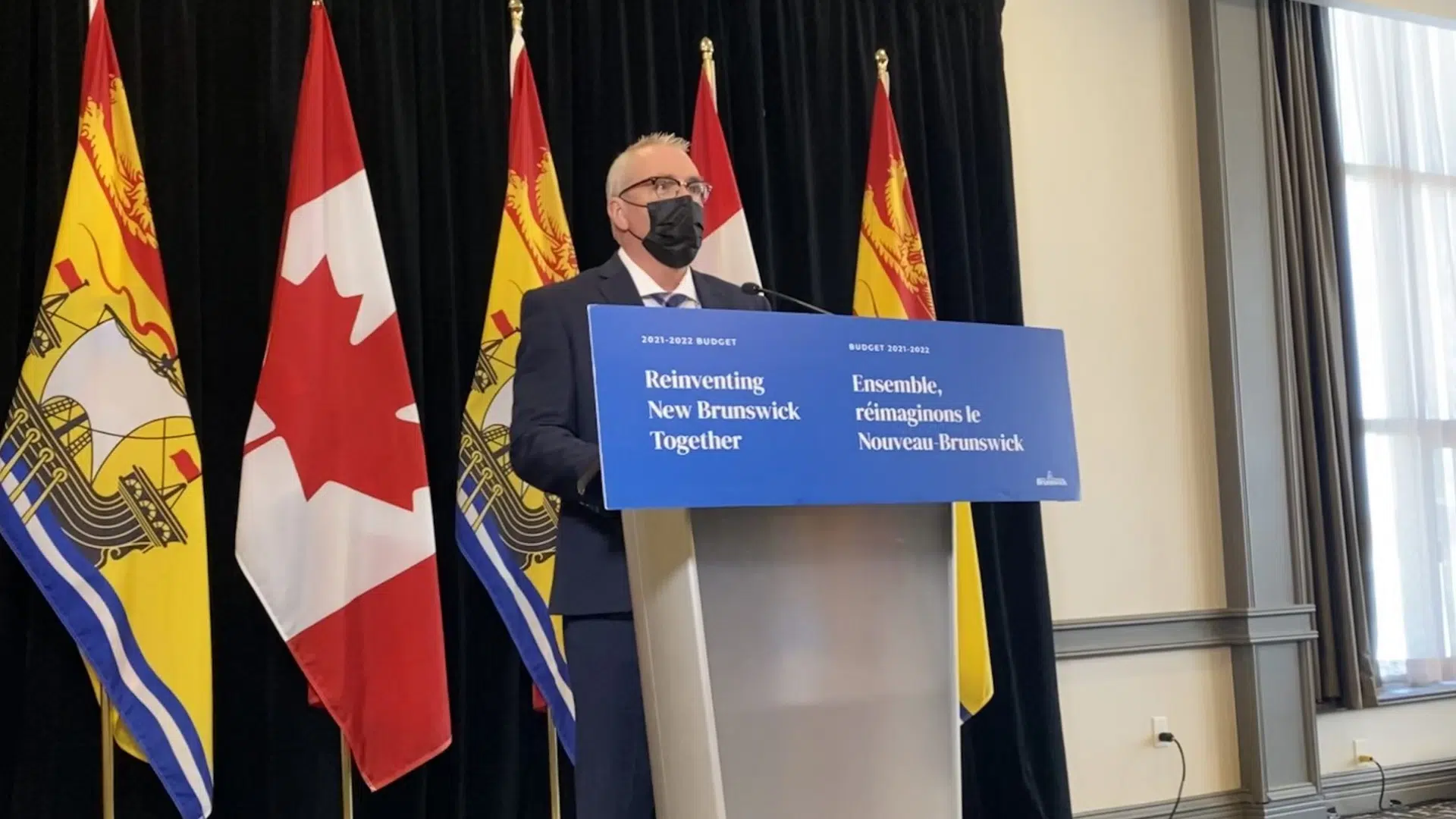The New Brunswick government is projecting a deficit of $244.8 million in 2021-22 due to increased costs and loss of revenue because of the pandemic.
The Finance and Treasury Board released the $10.6-billion budget Tuesday with an emphasis on investment in mental health services and public health care, as well as distance education, small modular nuclear reactors, affordable housing, and an increase to the carbon-emitting products tax as per the federal backstop requirements.
“It is not the budget I want to deliver, but it is the budget we need,” said Finance Minister Ernie Steeves told reporters during a news conference ahead of the budget delivery.
“These are truly uncertain times and I want to reassure New Brunswickers that we will continue to act decisively to provide the necessary supports should circumstances change in the weeks and months to come.”
Spending is expected to grow by 3.4 per cent in the upcoming year to $10.6 billion while revenue is anticipated to increase by just 1.2 per cent to $10.4 billion. The province’s net debt is expected to increase by $241 million.
Real GDP growth is projected to rebound by 2.9 per cent in 2021.
The main reasons behind the lower revenue are attributed to COVID-19 impacts. There are decreased projections for provincial taxes, agency revenues and sales of goods and services, although these costs were alleviated by federal funding.
“Federal health transfers are insufficient, and are based on a per-capita formula that does not meet the needs of New Brunswick’s population,” said Steeves.
“Premiers have called upon the federal government for a more meaningful health care partnership,” he said.
According to a release from the Finance and Treasury Board, investments will be made in the public health sector to alleviate demand for both physicians and mental health challenges.
About $7 million will be invested across different departments as part of the inter-departmental addiction and mental health action plan.
Public health investments include:
- $3.1 million for high needs children and youth, group homes, and professional care homes for children under the age of 12
- $3 million for addiction and mental health services
- $539,000 to the Canadian Mental Health Association BounceBack program to support youths over the age of 15 and adults
- $350,000 in support of recommendations from the Psychologists’ Resource Strategy intended to help address critical shortages in the mental health services sector
- $30 million to alleviate cost pressures and support
- additional nurse practitioner positions in remote locations
- strategies for reduction in the volume of patients without a family doctor
- dialysis expansion in Fredericton
- pediatric rehabilitation resources
More than $12 million will be invested to increase wages for home support workers, community residence workers, special care home workers, and family support workers.
An additional $11 million will be spent on physician recruitment, $1.6 million will be spent to expand the advanced care paramedics program, and $1.1 million will be used to increase social assistance rates.
More than $10 million has also been earmarked to replace 214 nursing home beds in Miramichi and build three new nursing homes with a total of 148 beds in Moncton, Fredericton and Miramichi.
A new surgical suite at the Dr. Georges-L-Dumont University Hospital Centre in Moncton will receive an additional $3.2 million.
$64 million will be invested in ongoing COVID-19 pressures including contact tracing, immunization, and to support access to virtual medical services such as Tele-Care 811.
Education supports will be primarily in the realm of distance learning with an investment of $3.9 million, as well as a wage increase of 75 cents per hour for qualified early childhood educators.
“Learning in these modern times requires more than having access to a computer. It also requires creating an education system where students can access a variety of tools online to make their learning more personalized to their specific interests,” said Steeves.
In the private sector world, the small modular nuclear reactor sector is receiving a multi-year investment to the tune of $20 million, something Steeves said the government has been making steady progress on in the hopes of attracting investors to the province.
There were no significant investments toward small business owners or tourism operators included, nor was there mention of funding towards Clinic 554.
A total of $3 million will be spent to expand information security systems and address broadband network gaps in the province.
“As we saw in Saint John last year, cyber threats and attacks are on the rise. This has a significant impact on service delivery and can influence New Brunswickers’ confidence that their information is safeguarded,” said Steeves.
“I want to assure New Brunswickers that we take our responsibility in safeguarding their information seriously and we will continue to work hard in fulfilling this duty.”
The travel incentive program, introduced to support the tourism sector which was hit hard by the effects of the pandemic, will be continued this year.
A total of $3.3 million will be invested in the Healthy Forests Partnership to ensure forests aren’t impacted by the spruce budworm.
The provincial government is conducting a comprehensive review of the current conditions in local rental markets and is also investing $10.8 million to increase the availability of affordable housing units.
A little over $2 million is going to the RCMP crime reduction unit for the purposes of reducing illegal drug supply within the province. $2 million is going to a safer communities program intended to work with law enforcement to disrupt cannabis, alcohol and contraband tobacco manufacturing, sale and distribution.
A new component included in the budget projection is a gender impact statement intended as the first step to acknowledging the policies put in place impact men and women differently.
“The gender impact statement for Budget 2021-2022 is a starting point for publishing information about the Gender-Based Analysis+ impacts of specific budget measures, and to signify a commitment to expanding our approach to gender budgeting,” said Steeves.
Within environmental investment, the province is increasing its tax on carbon-emitting products from $30 per tonne to $40 per tonne, which will result in a carbon tax increase of 2.21 cents per litre for gasoline and 2.68 cents per litre for diesel effective April 1.
The Climate Change Fund will receive $36 million to support
- research and development of advanced nuclear technology
- redevelopment of Fundy Quay
- reconstruction of the Saint Andrews wharf
- completion of 75 per cent of the actions in the New Brunswick Climate Change Action Plan by December 2021
Steeves said introducing a plan to balance the budget would be premature and possibly jeopardize the economic recovery of the province and create uncertainty in finances. He said the net debt increase is not welcome, but manageable.
“Today’s multi-year look outlook shows that we will continue to have challenges in restoring balance to our finances and provides important context as we consider the best path forward once our economy is on a stable footing.”
The province projects a deficit of $296 million in 2022-23 and $220 million in 2023-24.




